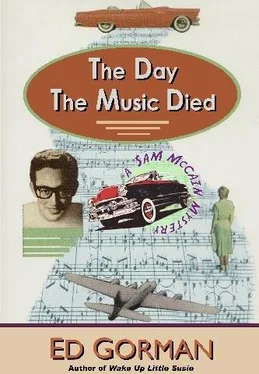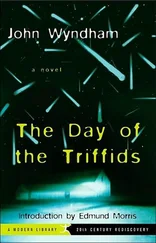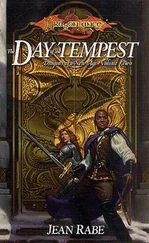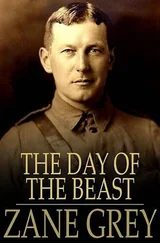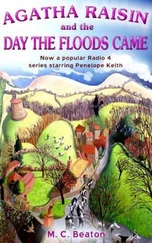Ed Gorman - The Day The Music Died
Здесь есть возможность читать онлайн «Ed Gorman - The Day The Music Died» весь текст электронной книги совершенно бесплатно (целиком полную версию без сокращений). В некоторых случаях можно слушать аудио, скачать через торрент в формате fb2 и присутствует краткое содержание. Жанр: Криминальный детектив, на английском языке. Описание произведения, (предисловие) а так же отзывы посетителей доступны на портале библиотеки ЛибКат.
- Название:The Day The Music Died
- Автор:
- Жанр:
- Год:неизвестен
- ISBN:нет данных
- Рейтинг книги:3 / 5. Голосов: 1
-
Избранное:Добавить в избранное
- Отзывы:
-
Ваша оценка:
- 60
- 1
- 2
- 3
- 4
- 5
The Day The Music Died: краткое содержание, описание и аннотация
Предлагаем к чтению аннотацию, описание, краткое содержание или предисловие (зависит от того, что написал сам автор книги «The Day The Music Died»). Если вы не нашли необходимую информацию о книге — напишите в комментариях, мы постараемся отыскать её.
The Day The Music Died — читать онлайн бесплатно полную книгу (весь текст) целиком
Ниже представлен текст книги, разбитый по страницам. Система сохранения места последней прочитанной страницы, позволяет с удобством читать онлайн бесплатно книгу «The Day The Music Died», без необходимости каждый раз заново искать на чём Вы остановились. Поставьте закладку, и сможете в любой момент перейти на страницу, на которой закончили чтение.
Интервал:
Закладка:
“Oh.” I got up and walked down the counter to where the wall phone was. I walked behind the counter and took the receiver from her hand.
“I don’t think she likes me much,”
Pamela said. “I suppose it’s because of you.”
“So what’s going on in the august Judge Whitney’s office?” I said, smiling at Mary as I spoke.
“A lot, actually. She wants you over here right away. Robert Frazier is in her chambers.”
Frazier was the father of Susan, the woman Kenny Whitney had married. And perhaps murdered.
“I tried to call her honor several times this morning,” I said. “The line was always busy.”
“It was crazy here. The press and all. I mean, both of them, the newspaper guy and the radio guy. And it was questions, questions, questions all morning. Finally, Judge Whitney threatened to get an injunction.”
I could see the judge up against the shambling, dandruff-laden Earle Peterson of The Bugle and the crew-cutted nitwit (“Hey, hang loose, Jack, elsewise I’ll be blastin’ off, you dig?”) Charlie O’Brian of Tops radio. Not many people knew this-it was sort of like the secret identity of the Shadow-but ace reporter and resident hipster Charlie O’Brian was also the voice of Trader Tom.
“Well, I’m glad things’ve calmed down.”
“So should I tell her you’ll be here right away?”
“Sure. See you.”
I hung up and when I turned back to Mary, I felt something I would’ve thought impossible. I felt jealous. Wes Lindstrom had his arm around Mary’s shoulder and was talking to her in the intimate whispers only lovers can understand. And she was smiling up at him, nodding.
When he saw me hang up, he said, loud enough not only for Mary but for the customers along the counter to hear: “I thought I had a shoplifter on my hands this morning. Our esteemed counselor here was walking out with a trashy magazine and he acted surprised when I asked him to pay for it. But I went along with it and just let him pretend that he’d just forgotten about paying for it.”
There was an angry undertone in his voice and the customers picked up on it. They weren’t sure if they should laugh or not. I saw Mary watching me, unhappy that he was doing this. I had a good comeback, even, asking him what he was selling trashy magazines for in the first place. But I decided against it. The customers were looking me over now and I could sense that the tide was against me.
“I’ll see you, Mary,” I said. I knew I was blushing. I felt alone, hunted, on the run. Growing up in the Knolls can do that to you.
Life is like that sometimes, as my father always says.
As I was walking out of the store, I slowed down in the aisle Ruthie had been in. There was a one-box hole in a span of six small boxes on the shelf. The product was called Potassium Permangatel. I wondered why she’d want something like that.
Seven
The day was a postcard, the warm sunlight on the snowy streets making the downtown area look not old but fashionably antique, from the stone gargoyles that guard the entrance to the First National Bank to the octagonal bandstand in the city square where Iowa boy Meredith Wilson of Music Man fame had guest-conducted the local symphony three years ago to the three blocks of retail stores, all showing the blue and tan awnings the chamber of commerce had talked them into buying a few years back. The temperature was up around thirty now and the air smelled clean.
The people looked clean, too-young, old, rich, poor, clean and bright and friendly, even the young ones in the black leather jackets and the duck’s ass haircuts. They liked to play at being bad, some of the older boys, but mostly what they did was cruise the loop area with their radios up too loud and call out to the pretty girls on the streets, and snarl at any male who wasn’t dressed the way they were.
There was a shortcut to the courthouse and I took it, down two alleys and one block over.
Halfway there, I came out on a narrow side street with a lumberyard, a Western Auto and a small tavern at the very end of the street. It was from the tavern I heard the shout, “You try’n come in here one more time you black bastard, and I’ll call the law on you! You see if I don’t!”
There was no mistaking the subject of this tirade: Darin Greene. He stood out in front of Paddy’s Tap with his hands on his hips, facing down Paddy, who owned the place, and Paddy, Jr., who spent most of his time guzzling up the profits and sounding off on politics. In his cups, he’d tell you that he had some kind of connection to the Kkk, but with Paddy, Jr., truth and lies sounded just the same.
Whenever he got drunk and wanted to pick a fight with somebody white, Darin Greene headed for Paddy’s, the only tavern in town that wouldn’t serve Negroes. Darin had been Kenny Whitney’s best friend all the way through school and until a year or so ago when they’d had a mysterious falling-out. In another time, Darin could have been a movie star. He had Harry Belafonte good looks and when he was sober, he could be a charmer. He’d probably had a dozen jobs since high school, losing all of them because of his drinking. He and Kenny had been the football stars. Darin played two years at the University of Iowa but got in trouble busting up a white dean’s son in a barroom one hot July night. He served six months in county and then headed straight to Chicago. Nobody saw him for nearly a year and then one day he drove back into town in a shiny new Olds convertible, a fine high-gloss yellow one. He’d lost twenty pounds and looked meaner than ever. The small knife scar he’d picked up on his left cheek didn’t hurt, either. Nobody was ever sure how he’d gotten the Olds or the scar but there was a lot of speculation. He immediately started hanging around Kenny again, spending a lot of time out at Kenny’s house, and less and less time with his wife and young son, who had not accompanied him to Chicago, Lurlene staying here and working as a nurse’s aide at the hospital. Cliff Sykes, Jr., our esteemed police chief, tried for a year to run Darin out of town, but thanks to Judge Whitney, he failed. Judge Whitney wasn’t all that crazy about colored people. She just enjoyed thwarting the will of any
Sykes anytime she got the chance.
Now, on a beautiful day like this one, two low-life white men were in Darin’s face and he was probably too drunk and confused to understand what was going on. He seemed to come to Paddy’s on autopilot. He got some kind of terrible pleasure out of it, as if this was the way he secretly believed he should be treated.
I walked on over.
Darin was drunker than I thought, weaving back and forth, leaning on the fender of his yellow Olds to keep himself from falling down into the slushy street.
“Why don’t you get in your car, Darin?” I said. “I’ll call Lurlene and she can come and get you.”
“You get your ass out of here, McCain,”
Paddy, Sr., said. “This buck wouldn’t be here if that judge of yours hadn’t got all them court orders against Cliff Sykes.”
“‘Bout time we started handling things our way,”
Paddy, Jr., said. “The way they handle ‘em down in Mississippi and Alabama.”
“‘Til the Jews went down there and started stirring up the coons, anyway,” Paddy, Sr., said. Darin was six-three and probably weighed 180 or 190, so it was quite a swing.
He’d have shattered Paddy, Sr.’s jaw if the punch had connected. But Darin was off-balance when he threw it and he also slipped on the ice. He followed his punch, ending up on one knee.
Paddy, Jr., moved quickly, raising his foot, ready to catch Darin a good one in the face or chest. Paddy, like his father, was round, sloppy and had a face made for sneering. My rage was right there waiting for me. I supposed Paddy, Jr., could take me in a prolonged fight, but my small size worked for me here. I was faster than he was.
Читать дальшеИнтервал:
Закладка:
Похожие книги на «The Day The Music Died»
Представляем Вашему вниманию похожие книги на «The Day The Music Died» списком для выбора. Мы отобрали схожую по названию и смыслу литературу в надежде предоставить читателям больше вариантов отыскать новые, интересные, ещё непрочитанные произведения.
Обсуждение, отзывы о книге «The Day The Music Died» и просто собственные мнения читателей. Оставьте ваши комментарии, напишите, что Вы думаете о произведении, его смысле или главных героях. Укажите что конкретно понравилось, а что нет, и почему Вы так считаете.
